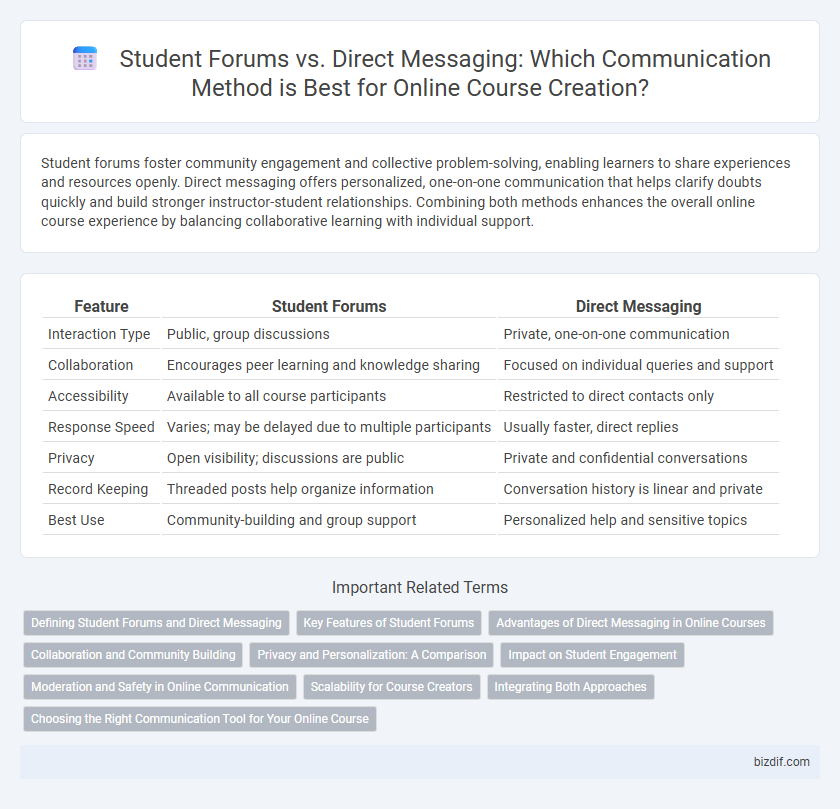Student forums foster community engagement and collective problem-solving, enabling learners to share experiences and resources openly. Direct messaging offers personalized, one-on-one communication that helps clarify doubts quickly and build stronger instructor-student relationships. Combining both methods enhances the overall online course experience by balancing collaborative learning with individual support.
Table of Comparison
| Feature | Student Forums | Direct Messaging |
|---|---|---|
| Interaction Type | Public, group discussions | Private, one-on-one communication |
| Collaboration | Encourages peer learning and knowledge sharing | Focused on individual queries and support |
| Accessibility | Available to all course participants | Restricted to direct contacts only |
| Response Speed | Varies; may be delayed due to multiple participants | Usually faster, direct replies |
| Privacy | Open visibility; discussions are public | Private and confidential conversations |
| Record Keeping | Threaded posts help organize information | Conversation history is linear and private |
| Best Use | Community-building and group support | Personalized help and sensitive topics |
Defining Student Forums and Direct Messaging
Student forums are online platforms where multiple learners can post questions, share resources, and engage in group discussions, fostering a collaborative learning environment. Direct messaging enables private, one-on-one communication between instructors and students for personalized feedback and support. Both tools enhance student interaction but serve different purposes: forums promote community learning, while direct messaging provides individualized assistance.
Key Features of Student Forums
Student forums offer a centralized platform for collaborative learning, featuring threaded discussions, topic categorization, and real-time notifications that enhance peer-to-peer interaction and knowledge sharing. They provide transparency in communication, allowing all students to view and participate in conversations, which fosters a sense of community and collective problem solving. Forums support multimedia integration and searchable archives, enabling easy access to past discussions and diverse learning materials for continuous engagement.
Advantages of Direct Messaging in Online Courses
Direct messaging in online courses offers personalized communication, allowing students to ask specific questions and receive immediate, tailored responses from instructors or peers. It fosters a private and secure environment for clarifying doubts, enhancing understanding without the distraction of broader forum discussions. This one-on-one interaction improves engagement, helps build stronger connections, and supports targeted feedback essential for personalized learning progress.
Collaboration and Community Building
Student forums foster collaboration and community building by enabling group discussions, peer feedback, and diverse idea exchange within an online course platform. Direct messaging supports personalized communication, facilitating one-on-one mentorship and quicker resolution of individual questions. Combining both tools enhances engagement by balancing collective collaboration with targeted interaction.
Privacy and Personalization: A Comparison
Student forums promote collective learning with open discussions, fostering diverse perspectives while maintaining moderated privacy controls to protect user data. Direct messaging offers enhanced personalization by enabling one-on-one interaction, ensuring confidential communication but requiring robust encryption to safeguard sensitive information. Balancing student engagement with privacy, course creators must choose the appropriate tool based on the desired level of interaction and data security.
Impact on Student Engagement
Student forums foster community interaction by enabling learners to share ideas, ask questions, and collaborate in real-time, which boosts engagement through peer support and collective problem-solving. Direct messaging provides personalized communication between students and instructors, enhancing motivation by addressing individual needs and feedback promptly. Combining both methods maximizes engagement by balancing open discussion with targeted interaction, leading to higher course completion rates and improved learning outcomes.
Moderation and Safety in Online Communication
Student forums enable centralized moderation, allowing instructors to monitor discussions, filter inappropriate content, and foster a safe learning environment. Direct messaging poses increased challenges for moderation due to private, unmonitored interactions, elevating risks of harassment or misinformation. Effective online course platforms implement robust tools combining forum oversight with controlled messaging to ensure student safety and maintain respectful communication.
Scalability for Course Creators
Student forums enable scalable interaction by allowing multiple learners to engage in discussions simultaneously, reducing the need for constant individual responses from course creators. Direct messaging demands more time per student, limiting scalability as personalized communication increases with course enrollment. Utilizing forums enhances community learning and lessens the workload for educators managing large online courses.
Integrating Both Approaches
Integrating student forums and direct messaging in online course creation enhances communication by combining broad peer-to-peer interaction with personalized support. Student forums foster collaborative learning and community building, while direct messaging offers private, timely feedback between instructors and learners. Leveraging both channels improves engagement, accelerates problem-solving, and supports diverse learning preferences.
Choosing the Right Communication Tool for Your Online Course
Student forums foster collaborative learning by allowing multiple participants to engage in open discussions, share resources, and build community, making them ideal for courses emphasizing peer interaction. Direct messaging offers personalized, private communication between instructors and students, enhancing prompt feedback and tailored support in courses requiring individualized guidance. Selecting the right tool depends on course objectives: use forums for group collaboration and engagement, and direct messaging for personalized, one-on-one communication to improve student satisfaction and retention.
Student forums vs Direct messaging Infographic

 bizdif.com
bizdif.com